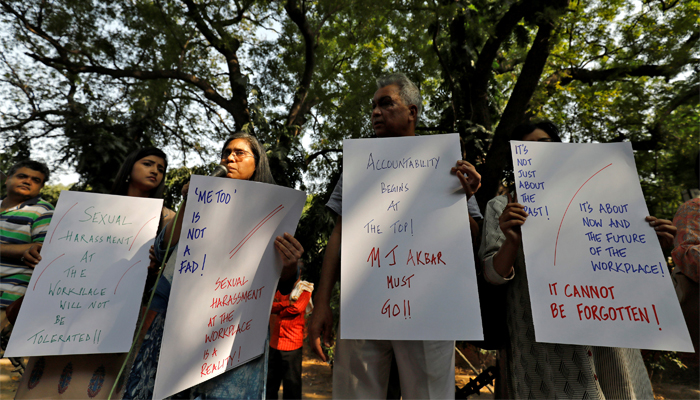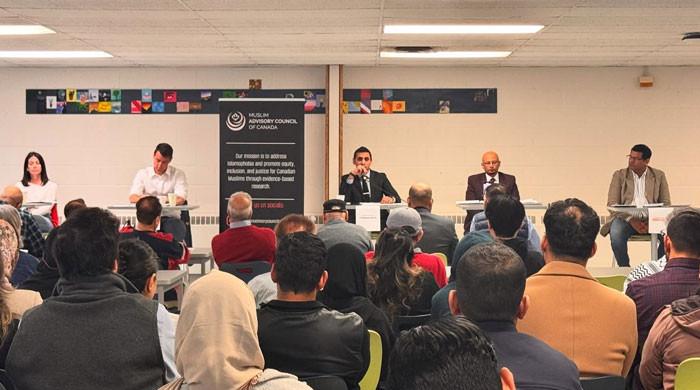Defamation suits aimed at #MeToo complainants could stall movement
'Criminal defamation is usually an arm-twisting tactic and works as a deterrent because nobody wants to be potentially embroiled in court for years or face a jail term'
October 18, 2018

NEW DELHI: Defamation lawsuits filed by two Indian public figures accused of sexual harassment have sparked warnings from women’s rights activists and legal experts that prolonged court battles could put the brakes on the country’s nascent #MeToo movement.
The movement, that began in the United States just over a year ago in response to accusations of sexual assault and harassment in the entertainment industry, gained traction in India in the past two weeks after a Bollywood actress complained about inappropriate behaviour on film sets and complaints of improper conduct roiled India’s biggest comedy group.
Since then, more than a dozen men in politics, media, entertainment, sports, and the arts have been accused of a range of offences, with several prominent figures either resigning or being suspended as a result.
The cases have transfixed India, published on newspaper front pages and becoming a key talking point on prime-time television news shows in a conservative country where discussions about sex are still taboo for many.
But two of those accused, junior foreign minister M.J. Akbar and veteran actor Alok Nath, this week launched criminal defamation suits against their accusers. Lawyers and women’s groups said that could act as a deterrent to more victims coming forward.
Unlike in many countries, where defamation is a civil offence, Indian law also has provisions that classify it as a criminal offence punishable with a jail term of up to two years.
Cases typically drag on for years in India’s overstretched legal system. Legal experts say defamation lawsuits, in particular, are sometimes used as a tool to stall opponents, especially against those who won’t have the wherewithal to respond effectively to such cases.
“Criminal defamation is usually an arm-twisting tactic and works as a deterrent because nobody wants to be potentially embroiled in court for years or face a jail term,” said Samudra Sarangi, a partner at Indian law firm Panag & Babu, which represents clients in defamation lawsuits.
“Sometimes this law is used to suppress a victim’s voice. Not all victims have the emotional fortitude to withstand the rigours of a criminal trial in India.”
Late on Monday, more than one hundred female authors, journalists and media figures signed a letter to Indian Prime Minister Narendra Modi calling for Akbar’s resignation and a government probe into the allegations.
“A criminal defamation charge is a clear attempt to bully, intimidate and silence those who are bringing to light systemic abuse of women by men in powerful positions,” said the letter, written by the Network of Women in Media, the Foundation of Media Professionals and the Brihan Mumbai Union of Journalists.
“By ignoring this defining moment, and watching silently while a government minister sues a woman who has spoken out, your government is giving a regressive message: that the fundamental right to life, safety and dignity of a sizeable section of the workforce does not matter,” it said.
Accused fight back
Modi is yet to publicly speak on the matter and calls to three spokespersons of his Bharatiya Janata Party were unanswered on Wednesday. However, Maneka Gandhi, minister for women & child development in Modi’s cabinet, has previously said a panel of judges will be set up to look into “some” of the #MeToo cases.
The opposition Congress party is piling pressure on Modi, who faces a series of big state elections later this year and a national election that is due by May 2019.
“We want to ask the prime minister on which side he stands. Is he with the women or against them?” Congress spokesman RPN Singh told reporters on Tuesday.
Akbar, who founded and edited several newspapers before joining politics, has been accused of inappropriate behaviour by at least a dozen women who had worked with him.
He has called the accusations “wild and baseless”.
On Monday, he filed the defamation suit against one of his accusers, journalist Priya Ramani, at a Delhi district court.
Ramani had “intentionally put forward malicious, fabricated and salacious” allegations to harm his reputation, the suit alleged.
Ramani said in a statement on Twitter on Monday that she was ready to fight the defamation allegation “as truth and the absolute truth is my only defence”.
Ramani and Akbar did not respond to Reuters requests for further comment on the case.
Ramani’s husband, journalist Samar Halarnkar, wrote a column on Tuesday saying the lawsuit was being used to “intimidate her, and through her to intimidate the others who have spoken up and silence others who have not”.
Meanwhile, Indian journalist Sucheta Dalal called for crowd-funding Ramani’s legal costs in a Twitter post that received more than 3,000 likes, although an official fundraising campaign is yet to be set up.
The other defamation case was filed by Nath, a well-known screen and television actor, against Vinta Nanda, a writer and producer who recently accused him of raping her in 1999.
Nath’s lawyer Ashok Sarogi has said the allegations against his client were false. He did not respond to a request to comment on the defamation suit on Tuesday. Nath and Nanda could not be reached for comment.











